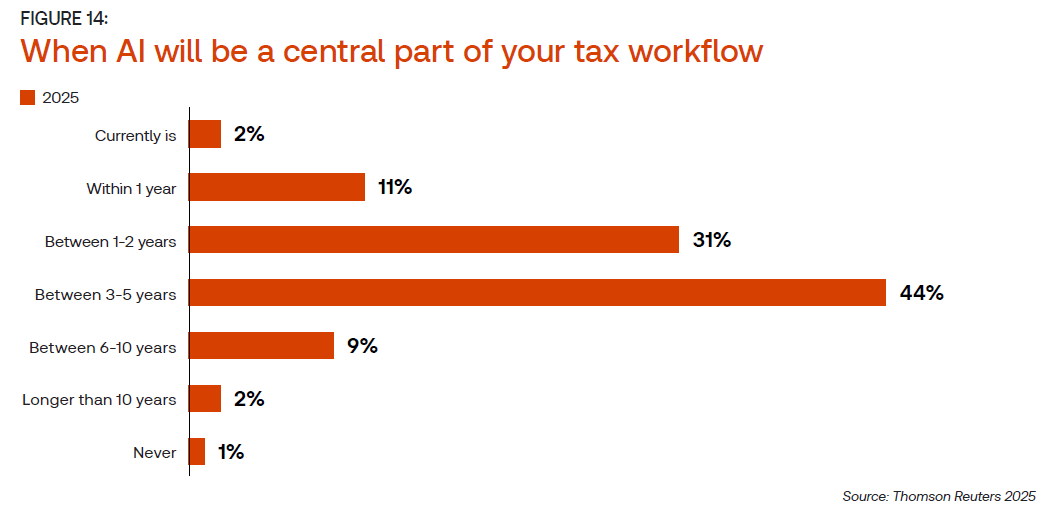The “2025 Corporate Tax Technology Report” finds that although many corporate tax departments are slow to adopting GenAI, their leaders are prepping budgets and personnel for widespread technology integration
The corporate tax world has historically been slow to modernize. Whether due to insufficient funding, a lack of technical know-how among its own tax professionals, or simply no interest in technology, the typical corporate tax department has trailed its parent business and even general finance peers in terms of keeping up with the rapid pace of technological change.
Jump to ↓
2025 Corporate Tax Technology Report
However, there are indications that this is beginning to shift — albeit carefully. The 2025 Corporate Tax Technology Report, the second annual report published jointly by the Thomson Reuters Institute and Tax Executives Institute, finds corporate tax departments beginning to fix structural technology issues, with long-term goals of increasing both the pace of technology adoption and the building of both personnel and processes infrastructure in order to make it more functional.
The report, based on a survey of corporate tax department leaders, shows that tax departments’ technology budgets are set to grow year-over-year, and survey respondents said they anticipate even more growth over the next 3 to 5 years. The same applies to technology personnel resourcing, as more respondents said their departments were hiring technology specialists and expecting job roles to change to better accommodate technology in coming years. Respondents said they also feel more positively about their colleagues’ tech competency and their department’s alignment with their larger businesses’ technology strategy.
And while few tax departments are currently adopting generative AI (GenAI), a vast majority said they believe it will be a central part of their workflows within the next five years. This indicates a willingness to change and adapt — a culture shift from the tax department of the past.
Key findings
Some key findings in the report include:
Positive outlook — On the whole, corporate tax professionals said they are positive about the impact tax technology has on their work and careers. A vast majority (94%) said they feel hopeful or excited about the future of tax technology, while just 2% said they are fearful or concerned.
Stratified but growing spend — Technology spend remains highly dependent on the size of the company and its tax department, with companies with $1 billion or more in yearly revenue averaging more than four-times the technology spend of smaller companies. Yet 74% of all respondents say they expect their department’s tech budget to increase in the next 3 to 5 years.
Changing job roles expected — More than one-third (39%) of respondents said they anticipate new job roles emerging as a result of technology (a 7-percentage point increase compared to 2024), and 55% said they anticipate job role changes as a result of technology (a 14-percentage point increase).
Exploring wider GenAI rollout — Not surprisingly, 43% of respondents said they have used AI for their own personal work in some form, but just 6% call their wider departments active users of the technology. Still, 88% said they believe AI will be a central part of their workflow within the next five years.

That is not to say that tax departments’ technology use has fully caught up to their business counterparts. Indeed, more than half of respondents still categorized their department as having a chaotic or reactive technology posture, indicating there is still room to be more proactive about both technology applications and strategy.
However, this increased focus has led many corporate tax professionals to feel optimistic about the future of tax technology, believing it can help aid some of the personnel crunch and regulatory onslaught felt across the industry.
“We are thinking of tax technology every day,” said one tax specialist interviewed for the report. “The shifting landscape is something that worries us, especially with regards to falling behind. We are interested in learning as much as we can about the technology tools that are becoming available and which ones will be the most important to focus on. It makes us nervous, but also excited.”
You can download
a full copy of the Thomson Reuters Institute “2025 Corporate Tax Technology Report” by filling out the form below:







